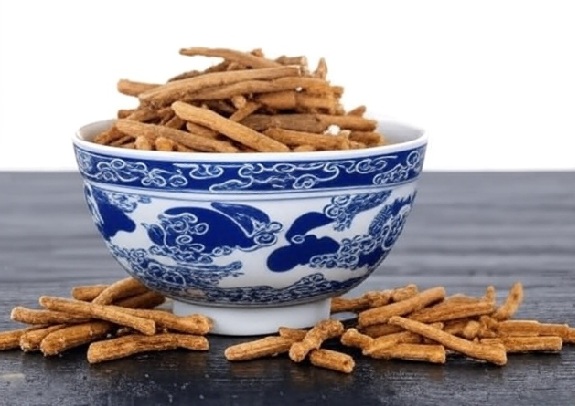Achyranthes Root Chinese Herb

Achyranthes Root (Niu Xi): A Circulation-Moving Herb for Joints, Blood Stasis, and Lower Body Health
Introduction
Achyranthes root, known as Niu Xi (牛膝) in Traditional Chinese Medicine (TCM), is a strong and flexible herb prized for its ability to invigorate blood, strengthen the tendons and bones, and guide qi and blood downward. With its bitter, sour, and neutral nature, Niu Xi is often used to treat joint pain, menstrual irregularities, blood stasis, and issues affecting the lower back, knees, and urinary tract. Whether used in classic trauma formulas or modern support blends, this versatile root provides targeted support for circulation and movement.
What Is Achyranthes Root?
Niu Xi refers to the root of Achyranthes bidentata, a hardy herbaceous plant native to China. In TCM, it is classified as bitter, sour, and neutral, entering the Liver and Kidney meridians. Traditionally, Achyranthes root is used to invigorate blood, dispel blood stasis, strengthen the lower body, and promote the downward movement of blood and fire. It is especially favored for treating conditions that involve weakness, stiffness, or blockages in the joints and lower extremities.
Health Benefits of Achyranthes Root
Invigorates Blood and Dispels Stasis
Niu Xi is used for blood stasis symptoms such as menstrual irregularities, amenorrhea, or trauma-related pain and swelling.
Strengthens Tendons and Bones
It is beneficial for weakness, soreness, or pain in the lower back, knees, or legs, especially in aging or post-injury recovery.
Promotes Downward Movement of Qi and Blood
Achyranthes helps redirect rebellious qi or blood downward, useful in headaches, dizziness, or hypertension caused by ascending Liver yang.
Clears Damp-Heat from the Lower Jiao
Niu Xi aids in treating urinary difficulty, painful urination, or swelling due to damp-heat in the lower body.
Assists in Labor and Promotes Menstruation
It is sometimes used under supervision to encourage labor or stimulate delayed menstruation by moving blood strongly.
How to Use Achyranthes Root
In Herbal Decoctions for Circulation and Joint Support
Simmer 6–15 grams of sliced Niu Xi with herbs like angelica root, red peony root, or safflower to promote blood movement and ease joint stiffness.
In Trauma or Recovery Formulas
Commonly included in classic formulas for bruises, fractures, or chronic blood stasis conditions.
In Lower Body Health Tonics
Often combined with kidney-tonifying herbs for formulas aimed at strengthening the legs, knees, and lower back.
Where to Buy Achyranthes Root
You can find Niu Xi at the following places:
-
Chinese herbal medicine shops
-
Asian apothecaries or herbal sections
-
Online retailers such as Amazon, iHerb, or TCM specialty suppliers
Look for:
-
Long, slender, dried roots with a slightly fibrous texture
-
Clean, uniform pieces free of mold or debris
-
Organic or pesticide-free certifications when available
Are There Any Side Effects?
Achyranthes root is generally safe when used appropriately. Due to its strong downward-moving action, it should not be used during pregnancy unless prescribed, especially during early stages. Those with blood deficiency without stasis should use cautiously. Consult a qualified practitioner for proper dosage if unsure.
Conclusion
Achyranthes root, or Niu Xi, is a powerful, blood-invigorating herb in TCM that strengthens joints, eases blood stasis, promotes healthy circulation, and supports lower body health. Whether brewed into circulation-supporting decoctions or included in trauma recovery blends, this dynamic root offers effective support for mobility, strength, and vital energy.
FAQs
Can I take Achyranthes root every day?
It is best used as part of a targeted formula under practitioner guidance, especially for chronic or recovery conditions.
What does Achyranthes root taste like?
It has a slightly bitter, sour flavor with an earthy undertone.
Is Achyranthes root safe for children?
Rarely used for children unless specifically prescribed for trauma recovery or joint issues under professional supervision.

